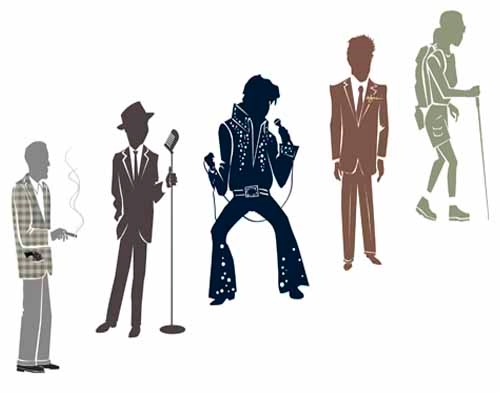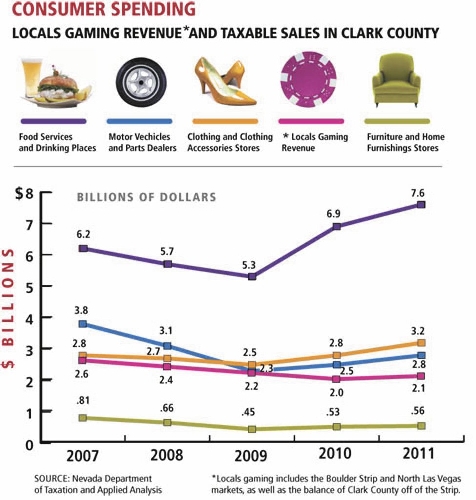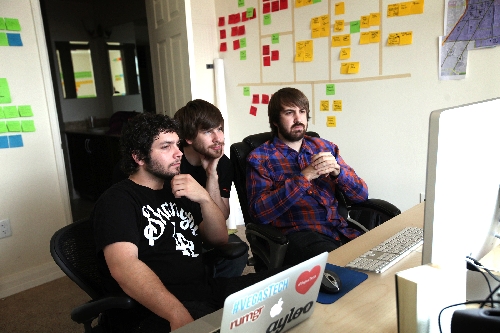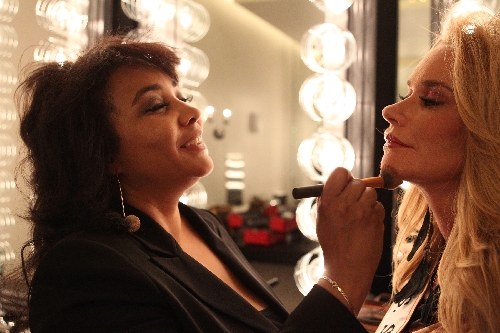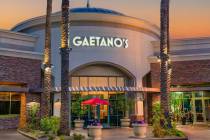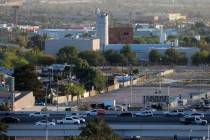With boom over, Las Vegas enters Era of Normal
The history of Las Vegas runs through the iconic figures who built the city. Bugsy Siegel. Frank Sinatra. Elvis. Steve Wynn. Debbie Harris. Debbie who? Here, let's introduce you.
Debbie Harris is a middle-aged Rotarian who enjoys walks, listening to novels in the car, taking road trips and spending time with extended family. She's never worked in a casino, and she's squeezing in college classes around a full-time job in training and marketing.
In short, Debbie Harris is probably a lot like you. And together, you and Debbie are the emblems of Las Vegas' next big era - the Era of Normal.
Don't believe us? Look at the stats.
From rising household income to increasing median age, from the shrinking share of gaming jobs to the growing number of households with kids, indicators show Las Vegas, the cow town that grew up as Sin City, is in many ways becoming Anytown, USA.
For decades, the city was just a place to make a fast buck for tourists looking to gamble, hook up or break up. It didn't have the loyalties and allegiances that people have for established cities. It didn't even have the pretense of being a community. And those icons of Old Vegas? Most of them never lived here.
Today, though, Las Vegas has reached a tipping point. Sure, it'll always be a global mecca for millions who want to gamble and carouse, but it's becoming much more than that. Post-boom, Las Vegas is a place to have a career and raise a family, even if you have nothing to do with gaming. And as people stay, they're remaking Sin City, joining clubs, starting businesses and encouraging friends and family to join them.
That's not to say this is the first time Southern Nevada has had loyal locals who care about the community. And thousands of Las Vegans likely would vamoose faster than a card counter who just spotted casino security if they weren't underwater on their homes. But fact is, hardly anybody's skipping town.
It's not what many experts predicted would happen as Las Vegas woke from a 20-year megaresort building binge that began with The Mirage in 1989 and ended with The Cosmopolitan of Las Vegas in 2010. But there it is: Las Vegas, still here, still growing and still home to an industry known for excess and discretion. But away from the Strip there's a touch of Tulsa, a dab of Des Moines.
A NEW VEGAS
The city's newfound stability surprises Jeremy Aguero, a fourth-generation Nevadan and native Las Vegan who studies economic and demographic trends. Aguero's firm, Applied Analysis, gave a presentation in 2009 about top local trends to watch. On the list? Population flight from Southern Nevada as casino construction ground to a halt and people who moved here for jobs fled 14 percent unemployment.
Three years on, that hasn't happened. No one's asking the last person in line to turn out the lights.
"It was a relatively abrupt end to that chapter of gaming and tourism construction, and yet the community goes on," Aguero said. "It continues, and people have stayed here. Who knew?"
Debbie Harris might have known.
It wasn't a resort job that lured Harris, 53, from Connecticut in 2006. She moved for the warm weather and because she had family here. Her brother came first, from California, in the mid-'90s. Her parents, stepparents, an aunt and an uncle followed. Now she also has a sister-in-law, a nephew and a partner here.
When her job as a real estate social-media marketer disappeared, she wasn't leaving Las Vegas. She opened a social-media marketing consulting business, Performance Intermedia.
Then there's Lisa Jackson, 42, from Austintown, Ohio, who started falling for Las Vegas in 2000 while visiting friends here. She dreamed of moving here, and finally did in 2010, after her mother passed away. Jackson took a marketing job with a local financial-services firm, then was laid off in 2011. A second job that involved marketing and administration for bridal shows also fell victim to the recession.
But, like Harris, Jackson stayed. She's now self-employed as a makeup artist, freelance writer and website builder.
"I'm staying for life," Jackson said. "The weather, the scenery, the atmosphere - I think people in Vegas are very nice. It's easier to be nice when you wake up every day and the sky is blue."
Harris and Jackson constantly tell friends and colleagues back East they need to move here, too. And they aren't recruiting alone.
Shaun Swanson, 23, was born and raised in Las Vegas.
"Growing up here was kind of a drag. There was definitely a fixation on the over-21 crowd, and Vegas is one of those cities that's almost the definition of urban sprawl," Swanson said. "People were moving farther and farther out. There was an exodus to the suburbs, and people were spread so thin it was hard for them to congregate, to come together and have a sense of community."
He left for college and didn't look back - until six months ago, when high school friends lured him back to work on a social-networking website called Ayloo. Swanson found a different city, one that's developing "a wonderful sense of community." He returned to his alma mater, Carnegie Mellon University in Pittsburgh, earlier in April to "rally people around the idea of moving to Las Vegas."
Swanson, Jackson and Harris represent a new normal: The job isn't the only reason to be here.
NORMAL, BY THE NUMBERS
"If everyone moved here simply for economic opportunity, we should have had tens of thousands of people leave," Aguero said. "If people were operating as profit-maximizing consumers acting totally in self-interest and based purely on economics, they should have walked away from their house and moved to wherever the next job was going to be. But so many people who moved here are choosing to stay here."
Numbers bear that out.
U-Haul's most recent figures show fewer people renting trucks and trailers to leave, and more driving in. The company helped 0.3 percent more people move here than leave in 2011. From January through March, it saw 3.7 percent more people move here than leave.
Yes, numbers from the Nevada state demographer show that Clark County lost nearly 16,000 residents from 2008 to 2009. But the county gained that back in 2010. The county had 1.95 million residents when the recession started in 2007, and as of July, it had 1.97 million.
And - what could be more normal than this? - the county gained nearly 13,500 new residents from 2010 to 2011 not because people moved here, but because people here had babies.
Then there's household earnings.
The census says the county's median household income rose from nearly $31,000 in 1990 to more than $56,000 in 2010. That's not a bigger-than-average growth rate, but Brian Gordon, an Applied Analysis principal, said 2010's income level reflects economic expansion and is high enough to encourage many residents to stay.
Joel Kotkin, author of "The New Geography" and an expert on economic and social trends, said people may be staying partly because of the weak national economy.
But something different is happening in Las Vegas, he said, and it's a natural evolution experienced by all big cities when they hit critical mass.
"When I would go to Las Vegas in 1975, nobody was from Las Vegas,'' Kotkin said. "There were literally just a few old cowboys. Now, you have a bigger group of people committed to the city, so it's less just a gambling enterprise in the desert. It's becoming a real city with a degree of normality."
Census data show the share of Nevadans born in the state rose from 21.3 percent in 2000 to 24.3 percent in 2010. And it's not just natives who stay, Kotkin said. People who moved here in their 20s a decade ago for work are now in their 30s. Many have children, and it's harder to decamp once you're older with kids.
Census numbers show it.
Las Vegas' median age rose from 34.4 in 2000 to 35.1 in 2010, though it's still lower than the national median of 37.2. That's probably because Las Vegas has more kids than average, Kotkin said. The average household size ticked up from 2.65 in 2000 to 2.69 in 2010, while the average family size rose from 3.17 in 2000 to 3.27 in 2010 - the reverse of what's happening in Los Angeles, where families with children are leaving, Kotkin said.
That more Las Vegans are staying put is critical. People with roots, and especially those with children, tend to get involved in the community.
Membership in the Nevada Youth Soccer Association is up 25-30 percent in the last two years, despite continued hard times and the $70-per-player fee. Pam Spendlove, the league's registrant, attributed the gain both to more kids in the community and to parents wanting them involved in sports.
There are more bowlers, too. At Texas Station, more than 300 kids ages 6 to 18 participate in bowling leagues, up from about 200 two years ago, said Jerry Francomano, manager of bowling operations. Among people 55 and older, participation has grown from 550 to more than 650 in the last two years.
If you need more evidence the city looks more normal these days, consider how much locals spend gambling. From 2009 to 2011, spending rose 12 percent on cars, 23.8 percent on furniture, 28 percent on clothes and 43.4 percent on meals out. On locals gaming, spending fell 4.5 percent in the period. From 2010 to 2011, locals gambling ticked up 1.6 percent, while all taxable sales categories in the county rose 6.3 percent.
That could signal pent-up demand for clothes, cars and other durable goods consumers put off buying in the recession. But it could also be a "change in the curve" - a permanent lifestyle modification similar to the way the Great Depression forever changed spending patterns among those who lived through it, Aguero said.
But it's not just the population that's looking more normal. The city's economic foundation is, too.
WHERE THE ACTION IS
When Internet retailer Zappos.com moved from San Francisco to Southern Nevada in 2004, the area looked very different. The Strip's construction army was still on the march. Wynn Las Vegas was nearing completion. Developers were snapping up land for luxury high-rises. CityCenter and The Cosmopolitan of Las Vegas were on the way. When the world talked Vegas, it was about unrelenting growth.
Back then, Zappos was a small Internet retailer with 60 employees doing $185 million in annual sales out of a Henderson office complex, driven here in search of low taxes, affordable housing, easier commutes and a customer service-oriented workforce.
Nearly a decade later, the Strip's modern building boom is done, and Zappos is a 1,500-employee, $1.2 billion business making international headlines for its plans to remake downtown Las Vegas as an urban office campus.
In the intersection of those two events is the New Vegas economy, Aguero said.
"The tipping point is two things: It's the end of an era relative to the construction of major assets along the Las Vegas Strip, and the revitalization of downtown," Aguero said. "The convergence of those two things really reflects a transition in who we are."
Statistics show Las Vegas was evolving even as the Strip was booming.
The Hachman Index, a measure of economic diversity, shows Nevada easily outpaced the nation in diversification between 2000 and 2010, with 90 percent of new jobs coming outside hotel-casinos. Forty-five new hotel-casinos opened statewide in the period, but 11,000 other businesses opened or moved here also. It's difficult to determine whether Las Vegas led cities in diversification, because it's hard to compare local stats to the nation's 384 other metro markets. But the city's movement from 53.8 to 60.1 on the 100-point index "is very impressive," Aguero said.
"I'm willing to bet that Las Vegas diversified as much as or more than any other metro area of its size," he said.
Much of the growth has come in education, health care and business and professional services. As those fields surged, the share of jobs in hotel-casinos dropped from 23.6 percent in 2000 to 19.8 percent in 2010, state numbers show.
That means we're not going to see just more of the same tourist trade, suburban sprawl and strip-mall ambiance that left Shaun Swanson pining for Pittsburgh.
Zappos is easily the most visible example of locals who have decided that Las Vegas is a place worth investing time, money and - perhaps most importantly - civic pride. The company will move its headquarters to the old City Hall in 2013, and CEO Tony Hsieh is spending $350 million to bring tech-based companies to downtown and to make Las Vegas a city where people want to live as well as work. Hsieh's Downtown Project for startups and community development is at its heart an effort to "lay the right foundation for Zappos for the next 30 years," Hsieh told the Las Vegas Review-Journal in March.
"The goal is to create everything you need to live, work and play within walking distance and to make downtown Vegas the most community-focused large city in the world," Hsieh said.
Swanson sees it happening.
Swanson said he never really went downtown as a kid. Today, he works and sometimes crashes at Ayloo's office in downtown's Ogden condominium tower. He said he likes the growing concentration of tech workers and professionals, as well as more restaurants, coffeehouses and theaters where people can meet.
"I always thought Vegas would have a really kick-ass community if people could just come together somehow," Swanson said. "I could finally envision the community I wanted, and I liked the fact that I could have a say in what it becomes. My three friends and I working on Ayloo have a passion not only for the idea of building a community, which is what Ayloo is all about, but along the way, building a community in Vegas. We all grew up here. It's just a natural call to action.''
Jody Sherman's on board. He moved from Santa Monica, Calif., into the Ogden in December, bringing his company, EcoMom, an Internet retailer of ecofriendly baby products, after Hsieh told him he'll invest only in businesses based here.
"I was really intrigued by the idea of the Downtown Project and the notion of building a community centered around something other than gambling," Sherman said. "The idea of getting involved in a nascent community that was forming, and the possibility to be an early influence in the community, was really exciting. I told my wife, 'I think in our lifetimes, this is the closest we're going to come to getting in a wagon, like pioneers, and finding a place we could go to build our fortune.' "
Now, Sherman's evangelizing. He wanted to get a good shave within walking distance of EcoMom's Holsum Lofts office, so he persuaded his California barber to open a shop nearby in early 2013. Sherman is also exhorting his favorite L.A. restaurants to open here.
Las Vegas is full of Jody Shermans moving in from Los Angeles, San Francisco, Seattle and Austin, Texas, and that's changing the face of Las Vegas, Zappos executive Fred Mossler said. The city doesn't have the cultural and educational infrastructure of those cities, but Mossler said it will get there.
"Las Vegas has a community of people who are committed to and passionate about building it," he said. "I think it's in the very early stages, but I think everyone sees this as just a great opportunity to be a part of something special."
Mossler moved from Henderson to the Ogden, and spends most of his time downtown. He says he definitely feels "an energy and a buzz."
"It just seems like there's so much momentum, and it will just continue to grow," he said.
Or not.
A FRAGILE TIPPING POINT
There's no guarantee the evolution of Las Vegas will continue.
For starters, the recession may be driving trends such as the falloff in locals gambling or moving on. Applied Analysis' prediction of out-migration could come true if the national economy picks up and creates lots of jobs elsewhere, Aguero said.
Plus, a greater sense of community is natural in hard times, when people tend to rely more on one another to get by.
As the economy improves, Las Vegas, not traditionally an altruistic place, could revert to form. And we have a long road back from where we've been.
The "utter failure" of the city's educational system, an important consideration for many businesses considering moving here, will also be a "millstone we are going to carry with us for a long time," Aguero said. "We've neglected our educational system for a generation, and we're going to pay the price for that."
And though the city made big strides on the Hachman Index, its score of 60.1 is still way behind other big cities, which have scores ranging from 75 to 100. What's more, every state wants to diversify and lure new businesses, and most of them are "light years" ahead in public startup funding, marketing dollars and educational endowments.
"We're not even competitive on the surface in those areas. We're embryonic," Aguero said. "That's hugely problematic for us."
Kotkin, who has studied the evolution of cities worldwide, sounded more optimistic. More families looking for affordable homes could leave California and move here, he said.
Given California's fiscal crisis and housing bust, it's tough for Californians to move these days. But if economic tensions ease in the Golden State and job formation picks up in Nevada, Las Vegas could add households who come here for reasons unrelated to gaming.
"You'll see a lot of people from California, because your housing will be so much cheaper," he said.
Las Vegas also has an identity, a history and a "mythology" that people identify with worldwide. It has McCarran International Airport for access to international markets, he notes. All it needs to do now is focus on becoming a better place for people already here - which means better roads and schools - and find what part of its DNA it needs to emphasize to get companies to relocate, Kotkin said. Chances are, it'll be a mix of old and new Vegas: well-rounded lifestyles, affordable housing, nonstop energy and the 24-7 pace would appeal to plenty of entrepreneurs, he said.
"The question is, what is a city for? It's a mechanism for people to go someplace and live a better life than they could have lived somewhere else," Kotkin said. "Unfortunately, urban culture in many places is focused on the high end and not about how middle-class people live. That could be a very great advantage for Las Vegas over time."
For Debbie Harris, it's a great advantage now.
"Being a Rotarian, I got to see this community from the perspective of people who live here, who have worked here and raised families here and made a commitment to Las Vegas," she said. "When I talk to friends about moving here, I talk about the opportunity to build a business here. This community is growing, it's open and it welcomes people. I think the people who live here are immensely committed to making Las Vegas the best place it can be."
Contact reporter Jennifer Robison at jrobison@reviewjournal.com or 702-380-4512. Follow @J_Robison1 on Twitter.
#NewNormalVegas
Do you have questions or comments on this story, or just want to know more? Join Review-Journal business reporter Jennifer Robison on Twitter from 1-1:30 p.m. on Monday for further discussion of the Vegas evolution.
Follow @J_Robison1 or search for #NewNormalVegas to participate.



